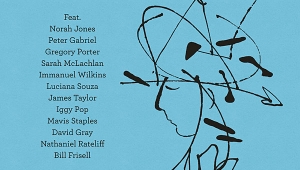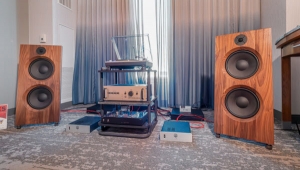| Columns Retired Columns & Blogs |
Recording of October 2023: I Inside the Old Year Dying

PJ Harvey: I Inside the Old Year Dying
PTKF (auditioned as 16/44.1 FLAC stream on Qobuz). 2023. Produced by PJ Harvey, Flood, and John Parish.
Performance ****
Sonics ****
PTKF (auditioned as 16/44.1 FLAC stream on Qobuz). 2023. Produced by PJ Harvey, Flood, and John Parish.
Performance ****
Sonics ****
In 2022, PJ Harvey published an epic poem called Orlam. Harvey's 10th studio album, I Inside the Old Year Dying, isn't exactly a musical setting of Orlam's English- and Dorset-dialect poetry; rather, it's an interpretation of the poem with added improvisation. The result is as bizarre and fascinating as one could hope.
The story, if that's the right word, feels ancient. On a farm in Dorset, a girl named Ira-Abel is watched over by the magical eyeball of Orlam, a lamb. Ira-Abel's world is confined to the farm and the woods next to it, making her imagination and the supernatural the only way to extend her experiences and show her a path out of innocence. To this surreal environment is added the ghost of a soldier, Wyman-Elvis, who channels Elvis Presley. The song "Lwonesome Tonight" (note the Dorset spelling) asks the soldier, "Are you Elvis? Are you God?"
This cycle includes 12 songs, representing the final year of Ira-Abel's childhood innocence. The opening "Prayer at the Gate" combines elements of R&B, atmospherics, and medieval chant into an ethereal welcome to Ira-Abel's universe. The gentle distortion of the synthesized sounds scrapes at the bones and makes the blood swirl. This intense effect is accomplished with a melody that's almost entirely stuck on a single pitch but dynamic enough rhythmically to trick the ear into believing it has a shape.
Harvey's experiments with vocal production are endless. She tries something new on every track. She introduces "Seem an I" a cappella, with a shaky, childlike tone; that voice suddenly focuses, a new voice entirely, as the sophisticated arrangement begins on the first verse. The album closer, "A Noiseless Noise," uses three more voices: low and jagged with glottal fry, piercing and strident against rolling drums and jangling guitar, then breathy and fragile.
"The Nether-Edge" pierces Harvey's voice with electronic blips that sound more like science fiction than fantasy. The lyrics speak of the passing of the spring months in the meadows, a timeline driven by the rites and traditions of farming. In "Mäy u'll tell if you'll live or die," Harvey warns, as she runs through a litany of rural signs of life and death.
Two actor friends join Harvey. Ben Whishaw (Paddington) sings the chorus on the funereal march "A Child's Question, August," while in "August," Colin Morgan (Merlin) sings the line "Love me tender, love me sweet." There's no escaping the spirit of Elvis in these songs, and somehow the girl's obsession with the mid–20th century icon does not conflict with the story's medieval sensibility. Not even this timeless corner of the earth is immune to the power of the King.
The album's arrangements and instrumentation are as imaginative as the songs and the singing. Harvey layers a range of acoustic instruments against the electronic ones to give the sound textural depth. The drum kit and hand percussion, working in a slow triple time on "Autumn Term," provide a rhythmic foundation upon which other instrumental timbres build, creating an enveloping sound world. "Lwonesome Tonight" is another example of the effective use of acoustic instruments. It also shows Harvey at her best as an inventive composer of melodies. She sings this one quietly and eerily at the top of her range. Twice, the word "love" is decorated with an ornament that evokes Middle Eastern music. Maybe it's the ghost of Scheherazade.
A major factor in the emotional impact of these songs is the nuanced control of the sound. For production, Harvey collaborated with two longtime colleagues. Flood's resumé includes Depeche Mode, U2, and New Order. John Parish has been producing and playing on Harvey's albums since 1995. Arguably, none of that experience quite prepared them for this project, which required a touch as delicate as it is complex. The fantastical images and sensations created in this album are like a tomb crisscrossed with spider webs. They shimmer when the light hits them after centuries in darkness, but even breathing too hard could rip them apart.
This is Harvey's first album since 2016's The Hope Six Demolition Project. Far from that record's heavy sound and political overtones, I Inside the Old Year Dying meanders into the gossamer long-past of English folklore. It's dark and creepy, but those brave enough to enter this world will have an experience worth remembering.—Anne E. Johnson
- Log in or register to post comments




































